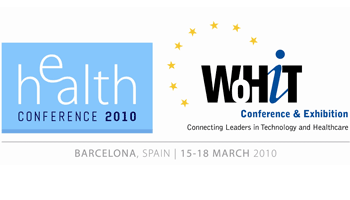 15-18 March 2010, Barcelona, Spain.
15-18 March 2010, Barcelona, Spain.Did you know that health care costs are expected to reach 16% of EU countries GDP by 2020? Attend the eHealth Week 2010 and find out how information and communication technologies can address the challenges of a rapidly ageing population and the expected increase of health care costs for public authorities.
The eHealth Week 2010 is the biggest event dedicated to digital solutions for health (eHealth) organised in Europe to date. It will gather over 2.500 participants representing public authorities, industry, users, academia, funding agencies and other experts to discuss the major challenges of the sector and to present the most innovative solutions that will shape the future of eHealth.
The eHealth Week 2010 combines the 8th High Level eHealth Conference 2010 and the 4th World of Health IT Conference and Exhibition. The event is a unique opportunity to:
- Meet with key policy makers and learn about the latest national eHealth deployment plans which will set the framework for a new eHealth policy in the EU
- Visit the large-scale exhibition and be the first to watch demos and experiment with innovative products and services available on the market
- Watch the interoperability showcase featuring state-of-the-art interactive demonstrations with live applications to share patient data across a range of healthcare settings
- Listen to education programme where speakers are the top experts in the field.
Neelie Kroes - newly appointed Vice President of the European Commission and Commissioner for Digital Agenda - and John Dalli - European Commissioner for Health and Consumer Policy - will be present at the event, as well as Spanish and Regional Ministers and other EU Member States Health Ministers.
Among the key note speakers: Pablo Rivero, General Director, Ministry of Health and Social Policy (ES); Marina Gelli, Catalan Regional Ministry of Health, Generalitat de Catalunya (ES); Bernat Soria, Professor, CABIMER Andalusian Center for Molecular Biology and Regenerative Medicine (ES); Andrew M. Wiesenthal, Associate Executive Director, The Permanente Federation (USA); Charles Friedman, Deputy National Coordinator, Office of the National Coordinator for Health Information Technology (USA); Enrico Coiera, University of New South Wales (AU); Denis Protti, University of Victoria's School of Health Information (CAN).
For further information and registration, please visit:
http://www.worldofhealthit.org
Related news articles:
About World of Health IT Conference & Exhibition
The World of Health IT Conference & Exhibition is the leading forum for the advancement of Health IT in Europe. Addressing the needs of key stakeholders in the European eHealth Community, The World of Health IT Conference & Exhibition offers professional development sessions, vendor exhibitions, best practice exchanges, networking sessions, and debates and discussions on the issues that will shape the future of eHealth. The WoHIT Organising Committee comprises the EC (European Commission), HIMSS (Healthcare Information and Management Systems Society), EUROREC (European Institute for Health Records), COCIR (European Coordination Committee of the Radiological, Electromedical and Healthcare IT Industry), EHTEL (European Health Telematics Association) and EFMI (European Federation for Medical Informatics). Since its inception in 2006, WoHIT has welcomed more than 5,000 attendees and 180 exhibitors from more than 60 countries throughout Europe and Worldwide.
About the High Level eHealth Conference 2010
Co-organised by the forthcoming Spanish Presidency of the European Union and by the European Commission, with the cooperation of the Government of Catalonia and the Foundation TicSalut, the High Level eHealth Conference 2010 is a ministerial event, representing since 2003 an important annual milestone in the field of ICT for healthcare. The conference theme of this 8th edition - "eHealth for Sustainable Healthcare Delivery: global challenges through local actions" - acknowledges the pressing perspective of a rapidly ageing European society, where the progressively extended life expectancy and the consequent increase in the prevalence of chronic diseases are globally posing serious challenges to the sustainability of national health systems. The conference will present how and why eHealth can make the difference in facing such a global challenge. Visit www.ehealthweek2010.org for more information.